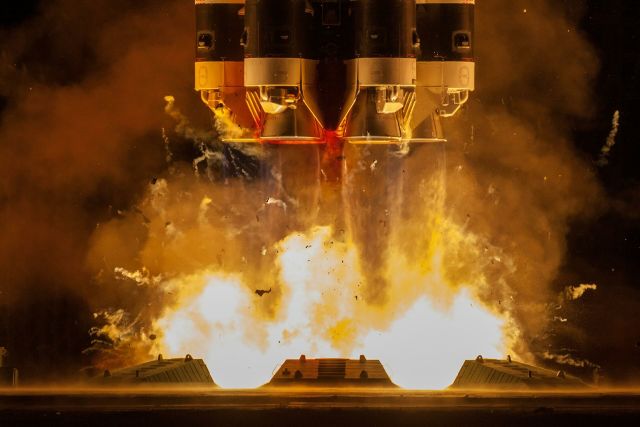The spacecraft is designed for the organization of digital television and radio broadcasting, high-speed Internet access and the provision of communication services on air and sea vessels in Russia and abroad
MOSCOW, March 25. /TASS/. After testing, the Express-103 spacecraft was put into operation as part of the orbital group of the Federal State Unitary Enterprise "Space Communications". This was reported on Thursday in the press service of the company.
"On March 25, 2021, the Express-103 spacecraft was put into operation as part of the orbital group of the Federal State Unitary Enterprise "Kosmicheskaya Svyaz" (SE KS) in the position of 96.5 degrees VD," the message reads.
It is noted that the satellite is intended for the organization of digital television and radio broadcasting, high-speed Internet access and data transmission, as well as the provision of communication services on aircraft and ships in Russia and abroad.
"The Express-103 spacecraft will replace the Express-AM33 spacecraft in an orbital position of 96.5 degrees VD and will provide communication in the eastern regions of Russia, as well as in the region of Southeast Asia. As a result, a significant improvement in the quality and reliability of the services provided is expected. It is also important that with the launch of the Express-103 satellite, we also provide almost 100% coverage of the Northern Sea Route, " the press service quoted Yuri Prokhorov, Acting Director General of the State Enterprise of the Russian Federation.
The Proton-M launch vehicle with the Express-80 and Express-103 satellites launched from the Baikonur cosmodrome on July 31, 2020. Then they were put into the target geotransfer orbit with a height of 54.9 thousand km due to several inclusions of the propulsion system of the upper stage "Breeze-M". The flight to the geostationary orbit with an altitude of 35,786 km was carried out with the help of its own electric jet engines SPD-100V.
About satellites
"Express-80" and "Express-103" were built by order of the Federal State Unitary Enterprise "Space Communications" on the basis of the unified medium-class platform "Express-1000N " developed by JSC" Information Satellite Systems "named after M. F. Reshetnev". The company's partner for the payload of new satellites is traditionally the European company Thales Alenia Space.
The devices are designed to provide fixed and mobile communication services, digital TV and radio broadcasting, high-speed Internet access, as well as data transmission in Russia and the CIS countries in the C-, Ku - and L-bands. The payload will include 38 (for Express-80) and 37 (for Express-103) main transponders. The active life of the devices is 15 years.

